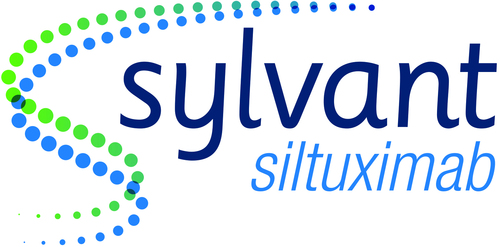For Immediate Release: April 23, 2014
Media Inquiries: Stephanie Yao, 301-796-0394, stephanie.yao@fda.hhs.gov
Consumer Inquiries: 888-INFO-FDA

SYLVANT Logo (PRNewsFoto/Janssen Biotech, Inc.)
6/10/2014 The U.S. Food and Drug Administration today approved Sylvant (siltuximab) to treat patients with multicentric Castleman disease (MCD), a rare disorder similar to lymphoma (cancer of the lymph nodes).
MCD causes an abnormal overgrowth of immune cells in lymph nodes and related tissues in the body. The disease usually affects adults who often suffer from fever, night sweats, weight loss and weakness or fatigue because their body’s immune system is weakened and cannot fight infections.
Sylvant is an injection that works by blocking a protein that stimulates abnormal growth of immune cells. It is intended for patients with MCD who do not have HIV or human herpes virus 8 (HHV-8).
“Sylvant is the first FDA-approved drug to treat patients with MCD,” said Richard Pazdur, M.D., director of the Office of Hematology and Oncology Products in the FDA’s Center for Drug Evaluation and Research. “Today’s approval demonstrates the FDA’s commitment to approving drugs for rare diseases.”
The FDA reviewed Sylvant under its priority review program, which provides an expedited review for drugs that demonstrate the potential to be a significant improvement in safety or effectiveness in the treatment of a serious condition. Sylvant was also granted orphan product designation because it is intended to treat a rare disease or condition.
Sylvant’s safety and effectiveness were evaluated in a clinical trial of 79 participants with MCD who were HIV and HHV-8 negative. Participants were randomly assigned to receive a combination of Sylvant and best supportive care, or placebo and best supportive care. Results showed 34 percent of participants treated with Sylvant and best supportive care experienced tumor response, while no participant treated with placebo and best supportive care did.
Common side effects include itchy skin (pruritis), weight gain, rash, increased levels of uric acid in the blood and upper respiratory tract infection.
Sylvant is marketed by Janssen Biotech Inc., based in Horsham, Pa.
For more information:
- FDA: Office of Hematology and Oncology Products
- FDA: Approved Drugs: Questions and Answers
- FDA: Drug Innovation
- NIH: Multicentric Castleman disease
The FDA, an agency within the U.S. Department of Health and Human Services, protects the public health by assuring the safety, effectiveness, and security of human and veterinary drugs, vaccines and other biological products for human use, and medical devices. The agency also is responsible for the safety and security of our nation’s food supply, cosmetics, dietary supplements, products that give off electronic radiation, and for regulating tobacco products.
